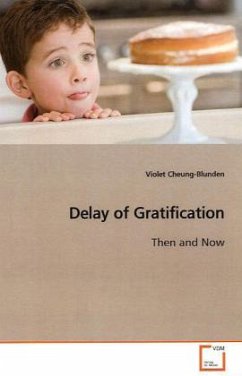The original study on delay of gratification was
conducted by Dr. Walter Mischel, who recruited
hundreds of preschoolers from the Bing nursery school
at Stanford University in the late 60s. Two
follow-ups of the original sample, first in high
school and then in college, showed that the number of
seconds that preschoolers were able to delay
gratification significantly predicted diverse
social-cognitive outcomes years later.
Impressed by these longitudinal findings, Daniel
Goleman, a science writer at New York Times,
popularized this concept as an aspect of Social
Intelligence and Emotional Intelligence. I was given
the opportunity to study the original Bing sample
while I was a graduate student at UC Berkeley.
Most of the original participants are now entering
into middle adulthood and many of them have children
of their own. This book reports new findings linking
delay of gratification to new outcomes in later
stages of life. The primary contribution of this work
is that it extends the stability of delay of
gratification from preschool to 40 years of age. In
addition, my work proposes an instrument to measure
adults ability to delay gratification.
conducted by Dr. Walter Mischel, who recruited
hundreds of preschoolers from the Bing nursery school
at Stanford University in the late 60s. Two
follow-ups of the original sample, first in high
school and then in college, showed that the number of
seconds that preschoolers were able to delay
gratification significantly predicted diverse
social-cognitive outcomes years later.
Impressed by these longitudinal findings, Daniel
Goleman, a science writer at New York Times,
popularized this concept as an aspect of Social
Intelligence and Emotional Intelligence. I was given
the opportunity to study the original Bing sample
while I was a graduate student at UC Berkeley.
Most of the original participants are now entering
into middle adulthood and many of them have children
of their own. This book reports new findings linking
delay of gratification to new outcomes in later
stages of life. The primary contribution of this work
is that it extends the stability of delay of
gratification from preschool to 40 years of age. In
addition, my work proposes an instrument to measure
adults ability to delay gratification.








